

Idaho Statutes. CFR 40. Grandview_audit_handbook. IDEQ Waste Management. Protecting Public Health and the Environment.
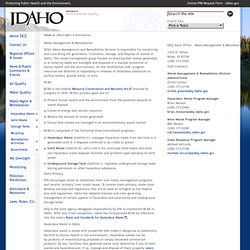
Idaho Department ofEnvironmental Quality Find it Fast. Low-Level Waste Disposal. Wastes (EPA) Hazardous Waste (EPA) Hazardous waste is waste that is dangerous or potentially harmful to our health or the environment.
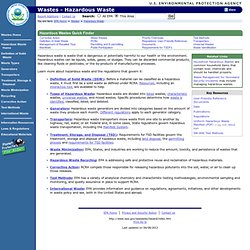
Hazardous wastes can be liquids, solids, gases, or sludges. They can be discarded commercial products, like cleaning fluids or pesticides, or the by-products of manufacturing processes. Learn more about hazardous waste and the regulations that govern it: Definition of Solid Waste (DSW): Before a material can be classified as a hazardous waste, it must first be a solid waste as defined under RCRA. Resources, including an interactive tool, are available to help. Hazardous Waste (TSDF) Through the Resource Conservation and Recovery Act (RCRA), Congress directed EPA to regulate all aspects of hazardous waste.
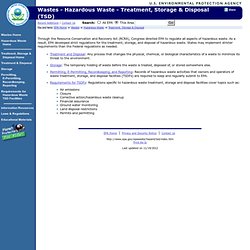
As a result, EPA developed strict regulations for the treatment, storage, and disposal of hazardous waste. States may implement stricter requirements than the Federal regulations as needed. Treatment and Disposal: Any process that changes the physical, chemical, or biological characteristics of a waste to minimize its threat to the environment. Restrictions TSDFs. Permitting for TSDFs. Permitting.
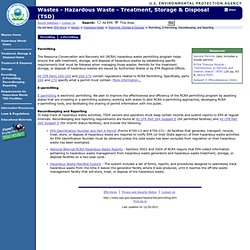
Permits05.pdf. Permit Guide (subpart x) IDEQ Permitting. Protecting Public Health and the Environment.
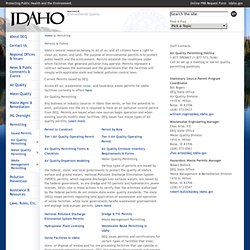
Idaho Department ofEnvironmental Quality Find it Fast Permits & Forms Idaho's natural resources belong to all of us, and all citizens have a right to clean air, water, and land. Current Permits Issued by DEQ Access all air, wastewater reuse, and hazardous waste permits for Idaho facilities currently in effect here. Air Quality Permitting Any business or industry (source) in Idaho that emits, or has the potential to emit, pollutants into the air is required to have an air pollution control permit from DEQ.
Requirements for TSDFs. Storage (TSDF) RCRA. The RCRA Online database is designed to enable users to locate documents, including publications and other outreach materials, that cover a wide range of RCRA issues and topics.
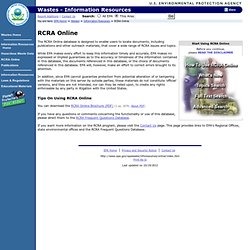
While EPA makes every effort to keep this information timely and accurate, EPA makes no expressed or implied guarantees as to the accuracy or timeliness of the information contained in this database, the documents referenced in this database, or the choice of documents referenced in this database. EPA will, however, make an effort to correct errors brought to its attention. In addition, since EPA cannot guarantee protection from potential alteration of or tampering with the materials on this server by outside parties, these materials do not constitute 'official' versions, and they are not intended, nor can they be relied upon, to create any rights enforceable by any party in litigation with the United States. Subtitle C.
What is RCRA?
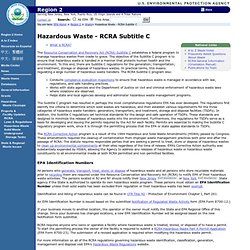
The Resource Conservation and Recovery Act (RCRA) Subtitle C establishes a federal program to manage hazardous wastes from cradle to grave. The objective of the Subtitle C program is to ensure that hazardous waste is handled in a manner that protects human health and the environment. To this end, there are Subtitle C regulations for the generation; transportation; and treatment, storage or disposal of hazardous wastes. In practical terms, this means regulating a large number of hazardous waste handlers.
RCRA Orientation Manual. This updated manual provides introductory information on the solid and hazardous waste management programs under the Resource Conservation and Recovery Act (RCRA).
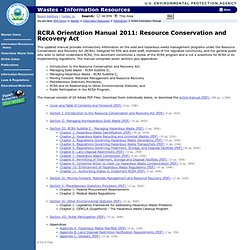
Designed for EPA and state staff, members of the regulated community, and the general public who wish to better understand RCRA, this document constitutes a review of the RCRA program and is not a substitute for RCRA or its implementing regulations. The manual comprises seven sections plus appendices: Managing Hazardous Waste (RCRA) 42 USC Chapter 82 - SOLID WASTE DISPOSAL. TSCA. Approval Code. Permit Example. PCB. Electronic Code of Federal Regulations Title 40: Protection of Environment PART 443—EFFLUENT LIMITATIONS GUIDELINES FOR EXISTING SOURCES AND STANDARDS OF PERFORMANCE AND PRETREATMENT STANDARDS FOR NEW SOURCES FOR THE PAVING AND ROOFING MATERIALS (TARS AND ASPHALT) POINT SOURCE CATEGORY Subpart D—Linoleum and Printed Asphalt Felt Subcategory Contents§443.40 Applicability; description of the linoleum and printed asphalt felt subcategory.§443.41 Specialized definitions.§443.42 Effluent limitations guidelines representing the degree of effluent reduction attainable by the application of the best practicable control technology currently available.§443.43 Effluent limitations guidelines representing the degree of effluent reduction attainable by the application of the best available technology economically achievable.§443.44 [Reserved]§443.45 Standards of performance for new sources.§443.46 Pretreatment standard for new sources. §443.41 Specialized definitions.
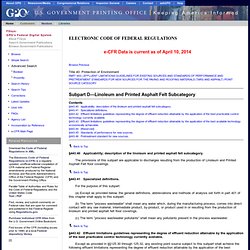
Toxics Release Inventory (TRI) Program. EPA Home TRI Home TRI is a database containing data on disposal or other releases of over 650 toxic chemicals from thousands of U.S. facilities and information about how facilities manage those chemicals through recycling, energy recovery, and treatment.
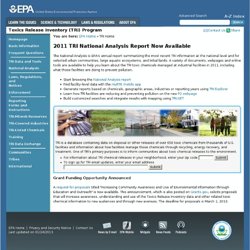
One of TRI's primary purposes is to inform communities about toxic chemical releases to the environment. Announcing the TRI University Engagement Initiative The TRI Program has launched a new initiative focused on developing sustained, mutually-beneficial relationships with colleges and universities. The 2011 TRI Preliminary Dataset is Now Available The 2011 TRI preliminary dataset contains the most current TRI data available and reflects toxic chemical releases and pollution prevention activities that occurred at TRI facilities during the 2011 calendar year. TRI Reporting Deadline Passes; TRI-MEweb Still Available The TRI reporting deadline of July 2, 2012, has passed.